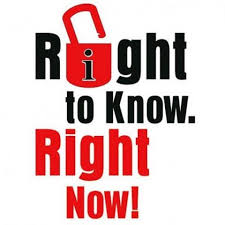Moses Okinyi
NAIROBI KENYA. The International Right to Know Day was proposed on 28 September 2002 at a meeting of Freedom of information organisations from around the world in Sofia, Bulgaria, “in order to raise awareness about people’s right to access government information while promoting freedom of information as essential to both democracy and good governance”. Freedom of information organisations and advocates around the world have since marked the date with activities to celebrate and raise awareness of the right to information.
The FOI activists established the International Freedom of Information Advocates Network (FaOIAnet), with ICJ Kenya an active member. The members of the newly found FOIAnet agreed to collaborate in promotion of the individual right of access to information and open, transparent governance and adopted a Memorandum setting forth the goals and activities of the network.
KENYAN LEGAL AND POLICY CONTEXT FOR ACCESS TO INFORMATION
The painstaking efforts of the Freedom of Information Network in Kenya of drafting and publicizing the Freedom of Information Bill finally came to fruition through the enactment of the Freedom of Information Act of 2016. This has been an ongoing campaign since the year 2000 spearheaded by ICJ-Kenya in consultation with various stakeholders, members of the Freedom of Information Network, and supported by many Kenyans countrywide.
The FOI Act has very progressive provisions. It promises to usher in an era of openness, transparency and accountability in Kenya. Enactment of the FOI Act confirms Kenya as a leading democracy in Africa, and one of the few countries to have an FOI Law.
The right of access to information is an important human right, necessary for the enjoyment of other human rights. The right to information is essential for transparent and accountable government. The right of access to information makes possible the public involvement in formulating social policies and in the decision-making processes of governance. The right to information can only be effectively exercised and implemented on the basis of laws, regulating this right in accordance with international standards.
Constitutional Context
- Article 1 of the Constitution vests the country’s sovereign power in the people of Kenyans hence entitling them to all information in the custody of the government.
- The preamble of the Constitution signals citizens’ desire to have a government that is founded on the values of human rights, equality, freedom, democracy, social justice and rule of law. Right of access to information is part of these values
- Article 10 further outlines the national values and principles all of which speaks to citizens’ right to information.
- Article 35 expressly entitles every Kenyan to access information held by the government and any other person where necessary.
- Article 20(4) obligates the courts to interpret any fundamental right in the Constitution like the freedom of information in a manner consistent with the principles of an open and democratic society.
- Article 232 obligates civil servants to abide by the value of transparency and the provision to the public of timely, accurate information.
- Devolution also captures the aspects of access to information in its object of promoting democratic and accountable exercise of power.
- Article 24 of the Constitution requires any limitation to the right to access information to be reasonable and justifiable in an open and democratic society.
GLOBAL FRAMEWORK AND STANDARDS ON ACCESS TO INFORMATION
The right of access to information is widely recognized by a number of international and regional agreements as a fundamental human right. These instruments are:
- The UN General Assembly Resolution No. 59 (1) of 1946 considers it as the cornerstone of all other fundamental human freedoms acknowledged by UN.
- Articles 19 of the Universal Declaration of Human Rights and International Covenant on Civil and Political Rights make this right an integral part of the right to freedom of expression and opinion.
- UN Special Rapporteur on Freedom of Opinion and Expression in its annual reports made the freedom of information a stand-alone right that is distinct from the right of freedom of expression.
- Article 9(1) of the African Charter on Human and People’s Right entitles every individual to the right to receive information and outlines the principles that should govern the exercise of this freedom.
- Article 9 of the African Union’s Convention on Preventing and Combating Corruption obligates African governments to adopt legislative and other measures to give effect to the right of access to any information that is required to assist in the fight against corruption and related offences.
- The Secretariat of the Commonwealth Law Ministers of Europe has established principles on freedom of information and even developed a model law to guide countries that have yet to enact laws providing for access to information.
- The Aarhus Convention of 1998, adopted by the Member States of the United Nations Economic Commission for Europe (UNECE) and the European Union, also establishes clear principles and standards on access to information.
The right to access information is a fundamental right belonging to every citizen which provides them with the knowledge base for making informed choices. It promotes democratic governance as it empowers the citizens to ensure that the government is open, transparent and accountable to them. As citizens enjoy this right, they are facilitated to enjoy other fundamental rights such as the right to freedom of expression, freedom of opinion, the right to public participation and the right to free and fair elections, among others. This is a right that is generally essential for the development of a country Kenya included.










